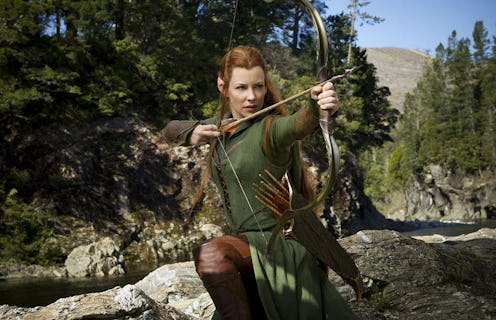
Help us, Evangeline Lilly. You're our only hope (in the new film The Hobbit: The Desolation of Smaug ). As a fan of J.R.R. Tolkien, I can resolutely say that thus far, The Hobbit movies are a disappointment. Unlike Peter Jackson's magnificent Lord of the Rings trilogy, The Hobbit trilogy turns Tolkien's smallest, most precious childhood memory of a novel into a three-part, nine-hour (plus) epic in which excess time is filled by 45 minutes of dwarfs singing and an exorbitant amount of time spent with Radagast's sled led by prancing bunnies.
The Hobbit is a book for kids, dealing with somewhat softer themes than the LOTR trilogy, so the singing and bunnies are understandable. Still, it's an epic strong enough to be adored by adults long after they've grown and cutesy elements aren't enough to derail it. The real problem is that the relatively small Tolkien novel is being diluted into a rather drawn out affair throughout these films. And going into the second installment of the series, The Desolation of Smaug, the film seems sure to upset us once more with the addition of characters who were not a part of the novel — namely Tauriel (Lilly), the fierce head of the elven guard. She was created as a method of repairing the strong gender imbalance in The Hobbit, and while she's off-book (a horrible concept to a Tolkein-ite), she may actually be the only reason I actually see this film.
Firstly, we already knew this film will stray from the book — we came to terms with that when we learned that Orlando Bloom's Legolas would weasel his way out of the LOTR trilogy and into the plot of The Hobbit (a book in which he was never mentioned). With the fact that these movies are an interpretation and expansion on the pages set forth by Tolkien is already set in stone, so it's time to move onto the positives and The Desolation of Smaug offers a sizable one: The Hobbit finally has a female hero in this film iteration.
It's something Lilly feared from the start. She told EW recently that she is such a Tolkien fan that she refused (for a while, anyway) to see Jackson's LOTR trilogy and that when she was offered the role of Tauriel, she thought "Whoa, people are going to hate me."
But, it's hard to hate a woman who's already shown she's a force to be reckoned with onscreen (LOST and the ubiquitous Hobbit trailers should be evidence enough), but she also made such a passionate case for the inclusion of her new character at a press conference for The Hobbit:
In Tolkien’s defense, he was writing in 1937. The world is a different place today, and I keep repeatedly telling people that in this day and age, to put nine hours of cinema entertainment in the theaters for young girls to go and watch, and not have one female character, is subliminally telling them, ‘You don’t count, you’re not important, and you’re not pivotal to story.
That statement is enough to make you paint Lilly's face on a flag and march to your local theater chanting "Taur-ee-ell, Taur-ee-ell!" Lilly is completely right. As young girls many of us gobbled up Tolkien's tale, mesmerized by Bilbo Baggins' bravery in the face of certain death, never questioning the fact that throughout the journey, there were no women to help him along. That's just the way it was, and we accepted it. There are giant, governing eagles and powerful male wizards, but not a single woman to even lend a word or two of encouragement. And now, not only do we have a woman present — in the way that Cate Blanchett's Galadriel appears to speak with Gandalf in the first film — we have a full-blown heroine whose purpose is to fight and get in on the action herself.
So, while we can't have The Hobbit we originally fell in love with — however perfect Martin Freeman is as the lovable Bilbo — at the very least we can enjoy a Hobbit-esque film in which our hero is joined by a character who helps to bring a wee bit of equality to a story born out of an era in which gender balance was still a long ways off.
Image: Warner Bros.